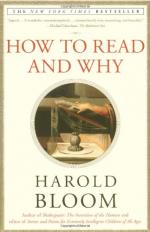|
This section contains 436 words (approx. 2 pages at 400 words per page) |

|
Are there places where Bloom seems to be inconsistent with his own philosophy. If so, how does he account for or justify the inconsistency? If not, what are the limitations of Bloom's consistency? What does he give up in order to remain self-consistent?
What does Bloom mean when he says that poetry can be a move of transcendence (p. 138)? What experiences does poetry transcend? Where does a person 'go' when they have made a poetic transcendence? Give examples from the text.
In his introduction to the chapter on novels, Bloom asks "how do you read a novel differently if you suspect you are one of a dwindling elite rather than the representative of a great multitude?" How does this book answer this question, or suggest possible answers to this question?
Do you think that the novel will survive in future ages. Using Bloom's arguments...
|
This section contains 436 words (approx. 2 pages at 400 words per page) |

|



